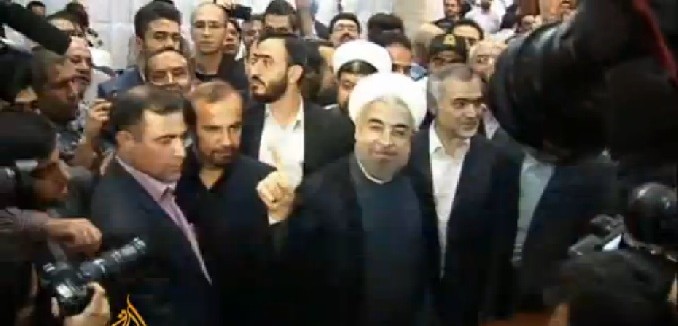“Mourning for Children: the Sins of fathers” is a powerful essay, which is not officially allowed to be read or cited in Iran. But it is the talk of the town and gossip among Tehran’s political, business, and academic circles. It was published in November, 2011, by Ali Reza Nourizadeh, an influential exiled Iranian political commentator.
The essay purports to reveal one of the most guarded dark secrets of Hassan Feridun Rouhani, the newly elected president of the Islamic Republic of Iran. In 1992, when Rouhani was studying for his second degree (MPhil) at Glasgow Caledonian University in Scotland, his son committed suicide. Rouhani was then 44 years old. Though he went on with his studies and life, completing his PhD at the university in 1999, his friends admit that he has never fully recovered for the tragic loss.
In his essay and subsequently in a broadcast by the Europe-based Radio Farda titled “In Search of Lost Children,” Nourizadeh published the strongly worded suicide note of the younger Rouhani. It was a Persian version of J’accuse aimed at the leading elite of the Islamic republic.
“I hate your government, your lies, your corruption, your religion, your double acts and your hypocrisy,” wrote the son “”I am ashamed to live in such environment where I’m forced to lie to my friends each day, telling them that my father isn’t part of all of this. Telling them my father loves this nation, whereas I believe this to be not true. It makes me sick seeing you, my father; kiss the hand of Khamenei.”
The father was among the first important disciples of Ayatollah Rohalla Khomeini, the founder and the first Supreme Leader of the Islamic Republic. He can be seen in a photo sitting next to Khomeini in the first row during a prayer at Khomeini’s “court” in Paris, from where he spread his sermons and messages to topple the Shah, then the royal ruler of Iran
After the Islamic revolution in 1979 Rouhani served under Khomeini and, subsequently, under the current Supreme Leader Ali Khamenei, at various capacities. He was a Member of Parliament (Majlis), deputy speaker of the house, and a member of the advisory board of the Islamic Republic of Iran Broadcasting (IRIB). After completing his thesis in 1999, “The Flexibility of Shariah (Islamic Law) with reference to the Iranian experience,” he was appointed the Secretary General of Supreme National Security Council (SNSC) and the national security advisor to Khamenei.
The highlight of his 16 year term was his handling of the nuclear negotiations with the International Atomic Energy Agency (IAEA) and the P5+1 (USA, Russia, UK, China, France and Germany). For his sophisticated approach he was nicknamed “the Diplomat Sheikh” by the Iranian, Arabic, and western media. Rouhani has the distinction of being the sole clerical member of Iran’s nuclear team. He conducted the nuclear negotiations with smiles and a readiness for minor concessions – but with an iron-clad determination to continue with the program. He agreed and convinced his superiors for a temporary suspension of the uranium enrichment for 10 months to avoid having Iran referred to the UN Security Council.
After Mahmoud Ahmadinejad was elected as president in 2005, Rouhani resigned from some positions but continued to be involved in public life. He ran a center for strategic studies and edited publication on foreign policy. During these years he published his memoirs, which described his role in nuclear negotiations. The book, titled, “National Security and Nuclear Diplomacy,” contains his reflections as the official in charge of Iran’s nuclear case and secretary of the. It gives an account of how decisions were made in Iran’s political system as well as the role of high-ranking institutions in the nuclear case and all stages of negotiations with the European countries along with the relevant documents.
“National Security and Nuclear Diplomacy,” which has been recently reprinted, is now a must read for every intelligence analyst and state official who wishes to know how Iran’s nuclear politics may be affected by the new president. In summary, it can be said that Iran will change its tone – it will be softer and more pleasant – but the music will remain the same.
[Photo: AlJazeeraEnglish / YouTube]




